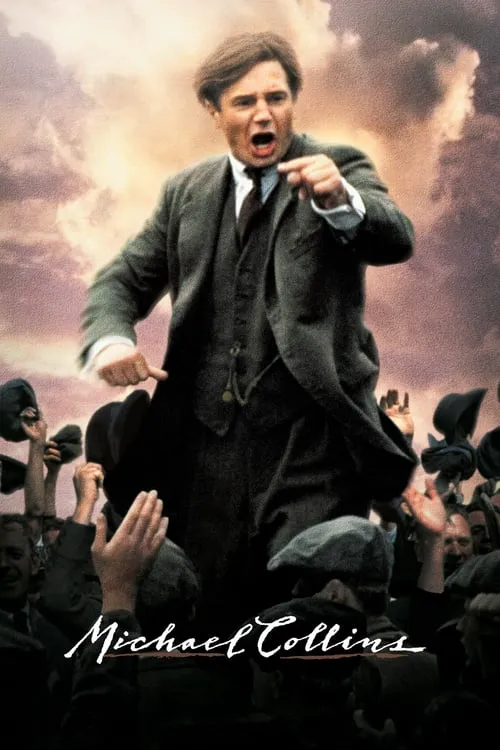Michael Collins

Plot
Michael Collins is a 1996 historical drama film directed by Neil Jordan and written by Jordan and Hugh Leonard. The film stars Liam Neeson in the title role of Michael Collins, a central figure in the Irish struggle for independence from the United Kingdom. Set in the 1920s, the film explores the tumultuous era of Irish politics during which Collins played a pivotal role in the establishment of the Irish Free State. The film opens with Michael Collins, born in Clonakilty, County Cork, as a young boy, watching his sister die in childbirth. This scene sets the tone for Collins' complex and driven personality, which would shape his future actions. Collins grew up to be a passionate advocate for Irish independence, joining the Irish Republican Brotherhood (IRB), led by Patrick Pearse and other notable figures of the time. Collins quickly rose through the ranks, utilizing his organizational skills, strategic thinking, and charisma to become a key leader in the Irish rebellion against the British government. In the film, the Easter Rising of 1916 serves as a catalyst for Collins' involvement in the Irish independence movement. Collins plays a crucial role in planning and executing the rebellion, working alongside Pearse, James Connolly, and other prominent leaders. Although the Rising ultimately fails, it galvanizes the Irish people in their pursuit of independence. The events of the Rising also mark a turning point in Collins' life, as he becomes disillusioned with the tactics employed by the British and sets his sights on a more pragmatic approach to achieving independence. As the years pass, Collins finds himself increasingly at odds with many of his former comrades-in-arms, who advocate for a more radical approach to Irish independence. In particular, he butts heads with Éamon de Valera, who emerges as a powerful figure in the movement. Collins is willing to compromise and negotiate with the British, while de Valera and others believe that such compromises will never lead to real independence. The film highlights Collins' complex relationships with key figures of the time, including W.T. Cosgrave, Arthur Griffith, and Harry Boland. Boland, in particular, serves as a foil to Collins, reflecting the divisions within the Irish movement. While Collins is willing to cooperate with the British to achieve a compromise that will give the Irish a degree of autonomy, Boland and others fear that such cooperation will undermine the Irish cause and ultimately lead to failure. One of the most compelling aspects of the film is its portrayal of Collins' relationships with women. His marriage to Kitty Kiernan is portrayed as a love match, but also as one that is complicated by Collins' increasingly central role in the Irish movement. The film suggests that Collins' commitment to the cause often takes precedence over his domestic life, reflecting the sacrifices that many individuals made in pursuit of Irish independence. As the years pass, Collins becomes an increasingly prominent figure in Irish politics. The film depicts his involvement in the negotiations leading to the Anglo-Irish Treaty of 1921, which granted the Irish Free State a degree of autonomy from the UK. However, the treaty also introduced partition, meaning that six counties in Ireland would remain part of the UK. Many Irish nationalists oppose the treaty, viewing it as a betrayal of their ideals. The film culminates in the Irish Civil War of 1922, which pits those who support the Anglo-Irish Treaty against those who reject it. Collins, who is initially a pro-treaty leader, finds himself increasingly isolated and vilified by his former comrades-in-arms. The final act of the film depicts the tragic events that unfold as the war rages on, culminating in Collins' assassination by anti-treaty forces in 1922. The film concludes with a haunting reprise of the scene in which Collins' sister dies. This serves as a poignant reminder of Collins' early life and his subsequent dedication to the cause of Irish independence. The film suggests that Collins' ultimate fate was sealed by his commitment to the Irish movement, which had become an all-consuming force in his life. Michael Collins is a powerful and poignant tribute to the life and legacy of a complex and often misunderstood figure in Irish history.
Ulasan
Rekomendasi




